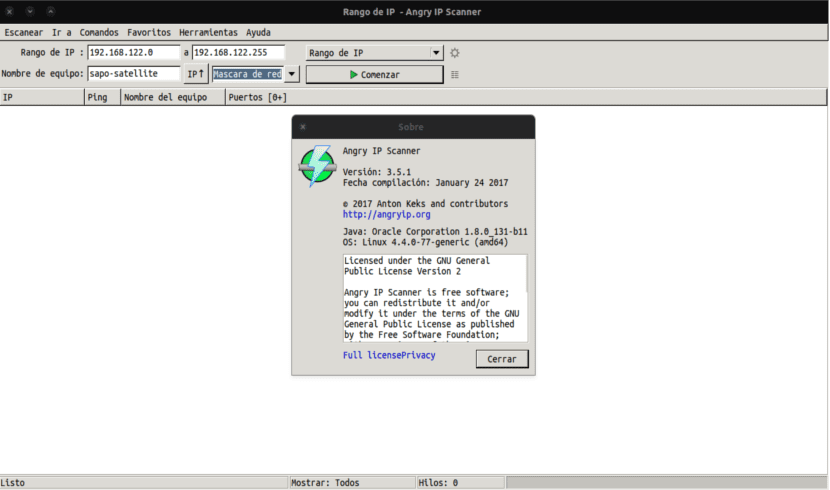
In the following article we are going to take a look at a very useful tool for users who want to keep a check on the devices that are connected to their private network. For large networks, an application like this may stay small if we do not add add-ons. The application is called Angry IP Scanner and with it we can scan networks effectively and easily. The functionalities of this program are perhaps more limited than those you can obtain with larger programs intended to perform network audits, such as Nmap. As a point in favor, say that the learning curve is much smoother compared to those more complex programs.
Angry IP Scanner allows you to detect IP addresses very quickly, while allowing us to scan your ports. Another interesting feature of the program is that we can save the collected data as TXT, CSV, XML or IP-Port list files. With this we will be able to generate a record of the devices connected to our network.
The greatest utility of this application is found when we use the dynamic assignment of IP addresses in our network, which is the most widespread option today. In these cases, the IP address of each device may vary from one session to another.
The program is cross-platform, lightweight and open source. It does not require any complicated installation since Ubuntu users have its corresponding .deb package. Mac OSX and Windows users also have their corresponding installers.
Angry IP Scanner operation
As I have already written, the main functionality of this application is to scan TCP / IP networks. This allows users to easily obtain IP addresses within any range of their choice. To achieve this, Angry IP Scanner offers users a very easy-to-use interface.
When we run the program, and Angry IP Scanner will detect all active IP addresses. In principle, this will resolve the MAC address of each one of them, it will show us its host name and its open ports. All these data will be shown to us as long as the devices found allow it.
The application simply pings each detected IP address to see if it is alive. As a general rule of thumb, if hosts do not respond to application pings, they are considered dead. This behavior can be changed in the Preferences dialog -> Navigation tab. In the same dialog box, the program will give us the possibility to configure the different methods to ping the found devices.
By clicking with the right mouse button on any of the hosts shown and selecting 'Open' the program will show us several ways to explore or check that device: Web Browser, FTP, Telnet, Ping, Trace Route, Geo locate, etc. This list of options can be customized to add other programs, such as opening with Google Chrome.
In order to increase the scanning speed, the program uses a multithreaded approach. This consists of creating a separate scan thread for each detected IP address. With that have achieved a higher scanning speed than other programs similar using a different approach.
Plugins for Angry IP Scanner
The application has additional features such as NetBIOS information (computer name and workgroup name), preferred IP address ranges, web server discovery, etc. If we still need more features, we can always turn to add-ons. With the help of these plugins, Angry IP Scanner can gather and show us more information about the scanned IPs. Any user who can and knows how to write Java will be able to create their own plugins tailored. So anyone can expand the functionalities of this program.
Download Angry IP Scanner
The full source code for this application is available on its home page. GitHub so that anyone who wants can take a look and contribute if they wish.
If you directly prefer to download and install the package for Ubuntu, go to your download page. There you can get hold of the 64 or 32-bit package. Then you just have to install it either with the Software Center or using the terminal.
Thanks, I'll see what machines are leaked on my network
I tried it years ago and I don't remember anything good. I prefer to use Nmap which works 100% and the best, it runs in the terminal.
This is just one more option than you can find. Nmap is indeed more powerful, but it is also quite a bit more complicated. It is all a matter of taste and of looking for what best suits the needs of each one. Greetings.
hello, excellent> 3